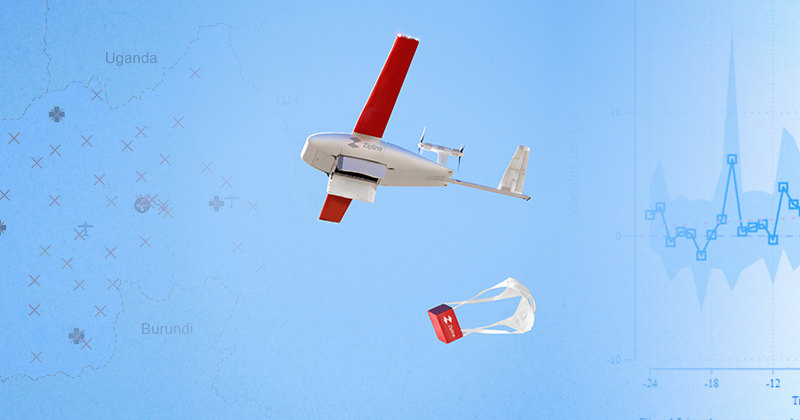


Measuring the impact of drone deliveries
Photos by Kathy F. Atkinson and courtesy of Zipline International | Photo illustration by Jeffrey C. Chase December 20, 2023
UD doctoral student studies Zipline benefit for hard-to-reach areas
Emergency healthcare requires quick access to medicine and supplies, access that often is delayed or difficult in some areas because of hard-to-reach or remote terrain. Such delays can prevent life-saving care.
Zipline International works to address this problem by using autonomous drones to deliver needed materials in such areas, including rural hospitals in Rwanda and Ghana. Instead of requiring several hours of ground transit over rough terrain, drones can deliver blood supplies in under an hour.
During an internship with the firm this year, University of Delaware doctoral student Olga Lebed has invested her research and data analysis skills to help assess the impact of Zipline’s work.
Now she is a co-author on a paper in Science Robotics that reports important data on how this drone delivery system has affected health-care outcomes.
The article, published Dec. 20, reports that expedited delivery of blood products using drones has made a significant impact in Rwanda, where Zipline has operated since 2016. Drawing on information from a 2022 publication in the Social Science Research Network’s online journal, the paper reports that drone deliveries reduced in-hospital maternal deaths from postpartum hemorrhage by more than half and reduced waste of blood products — because of expiration — by 67%.
Now, about 75% of blood delivered outside of Rwanda’s capital, Kigali, is delivered by drone, and the government has expanded use of the system to include therapeutic food for children and animal vaccines.
Zipline's reach has also expanded to eight countries, including the United States, and on Monday, Dec. 18, the company announced a new partnership with the National Health Service of the United Kingdom.
The Science Robotics article, co-authored by three Zipline employees, reports on the impact of Zipline drone services in Ghana, Kenya and Nigeria, including delivery of HIV and AIDS prevention and treatment supplies, vaccines, exam materials for students in areas affected by floods, and animal health products.
In Ghana, for example, Zipline reports making routine vaccines available to more than 15,000 children in the Western-North region and delivering more than 2 million COVID vaccines to remote regions of the country.
The article describes two platforms used by Zipline — P1 that uses GPS to expedite response and P2 designed for safe, precise delivery in dense, urban areas.
With those different techniques, Zipline provides an extensive, adaptable system that also is less harmful to the environment than traditional delivery networks. The authors say regulatory, logistical and technical obstacles should be addressed to enable greater access to these benefits.
“The pursuit of these solutions is not merely a technical endeavor, but also an ethical imperative and a guide toward a future where essential services are accessible to all, irrespective of geography or socioeconomic conditions,” the authors wrote.

Lebed is in her final year of doctoral work under the mentorship of Lisa Jaremka, associate professor in UD’s Department of Psychological and Brain Sciences.
During her internship at Zipline, Lebed has been part of the Monitoring and Evaluation Team, where she helps to design research to assess the impact of multiple projects.
“Many of my team members have backgrounds in epidemiology and public health, and I contribute my social science expertise, particularly in the areas of surveys and qualitative data analysis,” she said. “Additionally, some of the projects I am involved in focus on assessing health behavior outcomes. For example, I am currently participating in data collection for a project on HIV/AIDS commodities delivery in Kenya in collaboration with the Elton John AIDS Foundation.”
The work marks a turn in Lebed’s plans for the future.
While in Jaremka’s Close Relationships and Health Lab, Lebed was studying how weight stigma in health-care affects physical health outcomes, health behaviors and the emotional well-being of individuals.
“However, this is only one piece of my passion regarding health behaviors and equal access to health-care,” she said. “While pursuing my Ph.D., I realized that I wanted to pursue a career in industry research rather than a traditional academic path. I started looking for summer internships that could help me gain some industry experience. Zipline has a large internship program and the position in the Monitoring and Evaluation team definitely got me interested. Access to health care is something I personally care about, and I am really grateful that I got the opportunity to use my research skills to help the cause.”
Lebed earned a specialist degree in psychology at Yaroslavl Demidov State University in Russia, then moved to the U.S. and did research at Western Illinois University, collaborating with several social psychology labs. Her interest in how social relationships affect physical health prompted her to apply to work with Jaremka.
Contact Us
Have a UDaily story idea?
Contact us at ocm@udel.edu
Members of the press
Contact us at mediarelations@udel.edu or visit the Media Relations website

